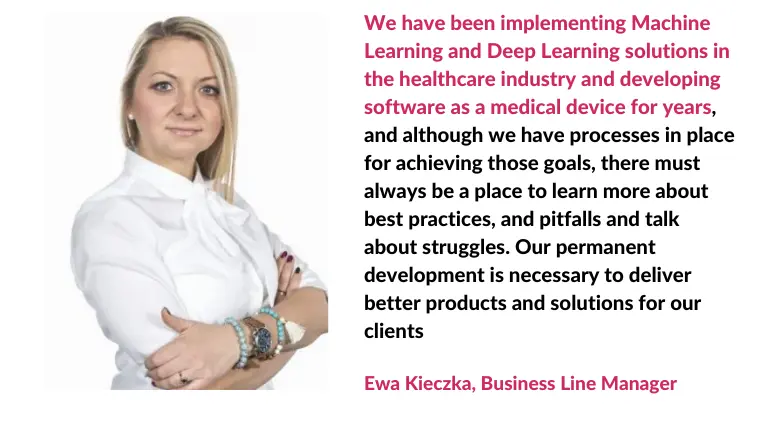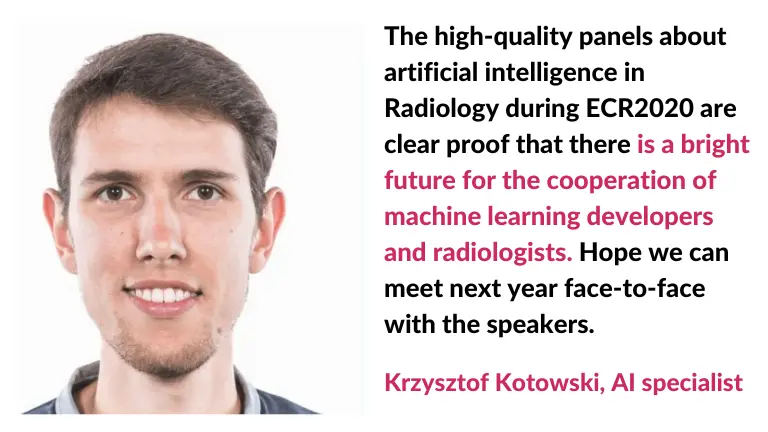Artificial Intelligence in Radiology: highlights of ECR 2020
ECR 2020 – dedicated to AI in radiology – in its first-ever online formula has ended. 15,265 Professional Delegates from 130 countries participated in the virtual congress and a technical exhibition. They were sharing knowledge and experience but all from the comfort of home.
It is the most important radiology and radiographic event in Europe. It can’t have been easy to move from a live event to online quickly, but the result has been brilliant. Fantastic booths, Q&A sessions, insightful lectures, great people to talk to. We have received all these unforgettable impressions during each ECR over the years and the past edition has delivered similar experiences. However, we all felt the shadow of a pandemic. Once again, we could all witness that radiologists are early birds when it comes to applying new technologies (and artificial intelligence) into the healthcare industry being agile is the core meaning of this approach.
Power of radiology
Most recently it has been covid-19 that reminded us about the power of medical imaging. Moreover, the promise present in medical images, is still hidden. To reveal the full potential of data, radiologists need to be equipped with the right tools. And as we believe artificial intelligence can meet this challenge. Algorithms can reduce clinicians’ workloads. Delivering images read quickly yet accurately. Although these words are constantly repeated at all radiological conferences. Although there has been clear progress in the use of AI in different imaging modalities and different therapeutic areas, radiologists are still reporting that their workload is permanently increasing:
„In a survey of 50 radiologists practising in the United States, 90% reported their workload had increased over the last 3 years, and 28% said it had increased by more than 20%. The primary reason, cited by 78% of those who reported a heavier workload was the increasing number of scans. As the academic literature affirms, the more scans conducted, the greater the need for radiologists to read them quickly yet accurately.”
Source: Alan Alexander et al., An Intelligent Future for Medical Imaging: A Market Outlook on Artificial Intelligence for Medical Imaging. https://doi.org/10.1016/j.jacr.2019.07.019
Artificial Intelligence in Radiology
Our focus during this year ECR panels was obviously Artificial Intelligence in radiology. “We have been implementing Machine Learning and Deep Learning solutions in the healthcare industry. Moreover, developing software as a medical device for years. Although we have processes in place for achieving those goals, there must always be a place to learn more about best-practices, pitfalls and talk about struggles. Our permanent development is necessary to deliver better products and solutions for our clients” – says Ewa Kieczka, Business Line Manager in our team.

Our ECR 2020 Artificial Intelligence highlights
The first panel about AI in Radiology during ECR 2020 The Summer Edition was a great introduction to deep learning and radiomics in the service of radiologist. All the speakers (Marleen de Bruijne, Ben Glocker, Nickolas Papanikolaou) agreed that Machine Learning experts and radiologists live in symbiosis rather than rivalry. They suggested procedures to follow in the development of AI in radiology. They were talking how to avoid frequent problems with bias and overfitting in the medical imaging data. Moreover, how to select between radiomics and Deep Leaarning. In his “causality matters” thesis, Ben Glocker presented how important causal relationships are in medical imaging data. Does the image cause the prediction target or vice versa?
The second panel about AI in clinical practice during ECR 2020 provided us with a load of information about use cases and assessment of AI algorithms in radiology. Bibb Allen presented the ecosystem for developing AI algorithms that can be effectively translated to clinical practice – the matter on which in Future Healthcare we are heavily focused on. Lena Maier-Hein, in the search for objective evaluation of AI challenges, mentioned the MICCAI and BraTS Challenge we regulary take part in, and showed how the evaluation metrics may drastically affect the ranking.
Luis Marti-Bonmati closed the session with a review of the current level of AI adoption in clinical practice. He showed that there is still much to achieve in this domain. Our AI specialist, Krzysztof Kotowski summarises: “The high-quality panels about artificial intelligence in Radiology during ECR2020 are a clear proof that there is a bright future for the cooperation of machine learning developers and radiologists. Hope we can meet next year face-to-face with the speakers.”

Contact us if you have any questions!